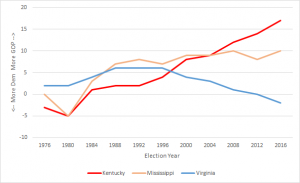One of the reasons why “Tuesday’s Elections Show Impeachment Might Not Boost GOP As Much As It Hoped,” according to Dominico Montanaro at npr.com: “Republicans have been saying that impeachment would backfire on Democrats and enthuse Trump’s rural base. But that didn’t pan out Tuesday in Kentucky and Virginia. Democratic voters in urban areas, on the other hand, are clearly fired up…They showed up, especially in Kentucky, in higher-than-usual numbers, while voters in rural areas didn’t. Trump, who only won 46% of the national popular vote in 2016, needs every last one of the people who voted for him then to come out again, especially as he has done almost nothing to try to win over persuadable voters this time around. Kentucky and Virginia could be warning signs that impeachment, even though the Trump campaign has raised lots of money off it, simply isn’t the issue Republicans hoped it would be with voters.”
Ronald Brownstein explains why “The Suburban Backlash Against the GOP Is Growing” at The Atlantic: “Amid all the various local factors that shaped GOP losses—from Kentucky to Virginia, from suburban Philadelphia to Wichita, Kansas—the clearest pattern was a continuing erosion of the party’s position in the largest metropolitan areas. Across the highest-profile races, Democrats benefited from two trends favoring them in metro areas: high turnout in urban cores that have long been the party’s strongholds, and improved performance in white-collar suburban areas that previously leaned Republican…“When Trump was elected, there was an initial rejection of him in the suburbs,” says Jesse Ferguson, a Virginia-based Democratic strategist. “We are now seeing a full-on realignment.”
“In both message and agenda, Trump has reoriented the Republican Party toward the priorities and grievances of non-college-educated, evangelical, and nonurban white voters,” Brownstein adds. “His campaign has already signaled that it will focus its 2020 efforts primarily on turning out more working-class and rural white voters who did not participate in 2016…But yesterday’s results again suggested that the costs of that intensely polarizing strategy may exceed the benefits. Republicans again suffered resounding repudiations in urban centers and inner suburbs, which contain many of the nonwhite, young-adult, and white-collar white voters who polls show are most resistant to Trump. If the metropolitan movement away from the Trump-era GOP “is permanent, there’s not much of a path for Republican victories nationally,” former Representative Tom Davis of Virginia, who chaired the National Republican Congressional Committee about two decades ago, told me.”
Brownstein continues, “Unique local conditions contributed to each of yesterday’s most disappointing results for Republicans. In Virginia, Democrats benefited from a court-mandated redistricting of some state legislative districts after the initial lines drawn by the Republican-controlled legislature in 2011 were deemed discriminatory against minorities. The new maps substantially increased the African American share of the electorate in four of the six state House seats that Democrats appear to have captured, according to data collected by the Virginia Public Access Project. Huge spending by outside groups focused on gun control, gay rights, and legal abortion also boosted Democrats there.” Republican Governor Matt “Bevin, a belligerent figure, was among the country’s most unpopular governors, and he provoked a fierce organizing effort against him by teachers and organized labor. “By all accounts, this was the best get-out-the-vote effort ever mounted in Kentucky by the Democrats… driven by the teachers and the labor unions,” says Al Cross, the director of the Institute for Rural Journalism at the University of Kentucky. Bevin also appeared to suffer in rural areas from his drive to pull back the state’s Medicaid expansion under the Affordable Care Act.”
Brownstein notes further that “Democrats reaped a double benefit: They increased their share of the vote even as turnout surged…Beshear won the state’s two largest counties—Jefferson (which includes Louisville) and Fayette (which includes Lexington)—by a combined 135,000 votes, according to preliminary results. That was nearly triple the total vote advantage that Jack Conway, the Democrats’ 2015 nominee against Bevin, generated in those two counties.” In both Kentucky and Virginia, Brownstein writes, “That widening separation between the GOP’s strength outside of metro areas and an intensifying tilt toward Democrats inside of them continues the underlying pattern of geographic polarization that has defined politics in the Trump era.”
Kentucky’s incumbent Governor Matt ‘Sore Loser’ Bevin has refused to concede to Governor-Elect Andy Beshear, and Bevin formally requested a “recanvass” under state law. Kentucky’s Democratic Secretary of State, who has declared Beshear the winner, “announced it would occur at 9 a.m. local time on November 14, in accordance with state law,” reports Adam Levy at CNN Politics. “All 120 counties in Kentucky are required to submit their certified vote forms by Friday. Those certified results will be recanvassed next week…A recanvass is a reprint of the receipts from voting machines to check for reporting or clerical errors. After ballots are scanned, the machine tabulates those votes and prints out a receipt with the total…During a recanvass, those receipts will be reprinted and checked again to make sure they were reported properly. It’s not uncommon for some clerical errors to occur during the initial vote tabulation. All 120 counties would then fill out and submit the same certification forms again with the recanvass results.” In the unlikely event that the election results are reversed, the national outrage could damage the Republican Party’s image even further.
So how will Virginia Democrats’ double victory affect propects for progressive reforms in that state? At FiveThirtyEight, Nathanial Rakich and Geoffrey Skelley write that “This shift could have all sorts of policy implications for Virginia, too. One big-ticket item could be gun control legislation. After a shooting in Virginia Beach in May, Northam tried to push through legislation in July that included universal background checks on gun purchases and an assault weapons ban but the GOP-controlled legislature refused to take it up. Democrats could also take up raising the minimum wage to $15, as most Democrats in the legislature previously backed the idea. Democrats have also promised to expand voting rights, protect the rights of LGBTQ Virginians, improve health care affordability, and ratify the Equal Rights Amendment to the U.S. Constitution. And last but not least, Democrats could have the final word on redistricting after the 2020 census, though a pending constitutional amendment for a redistricting commision might alter how the state draws lines.” Virginia could soon serve as the flagship state for what can be accomplished for working people when Democrats run government.
How important was gun safety reform in the Virginia flip? Writing at Vox, Jane Coaston notes in her article, “The NRA’s big loss in Virginia, explained,” that “across the state, gun control was the top issue for voters and for Democratic candidates, according to one poll, with several candidates running explicitly on vows to “take on the NRA” to pass gun control legislation. According to Everytown, that focus (and money) resulted in at least three flipped seats that helped Democrats take control of the legislature. Gov. Ralph Northam said Wednesday that he now hopes to be able to pass a slate of gun control measures, and “because of that Virginia will be safer.” Coaston reports that gun control groups heavily outspent the NRA, which is based in northern Virginia.
The Virginia flip will also strengthen the state’s Medicaid expansion reform, which was weakened during the enactment struggle. Looking ahead to the next state election in which health care security is very much at stake for thousands of Louisianans, Alexander Sammon writes at The American Prospect: “If, on November 16, Louisiana’s Democratic governor John Bel Edwards wins reelection, his victory could entrench his state’s own fragile expansion of Medicaid, as well. None of these victories will fix the deeply flawed health care system in the United States, or bring about single payer on their own, but they will expand coverage for scores of needy Americans, and could help give momentum to help bolster social programs or drive support for Medicare expansion this time next year.” Trump was in Louisiana yesterday supporting the Republican candidate for Governor. Those who want to help Democratic Governor John Bel Edwards hold the line on Medicaid expansion in Louisiana can contribute to his re-election right here.











